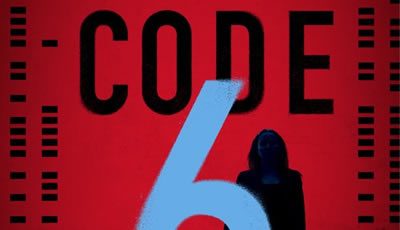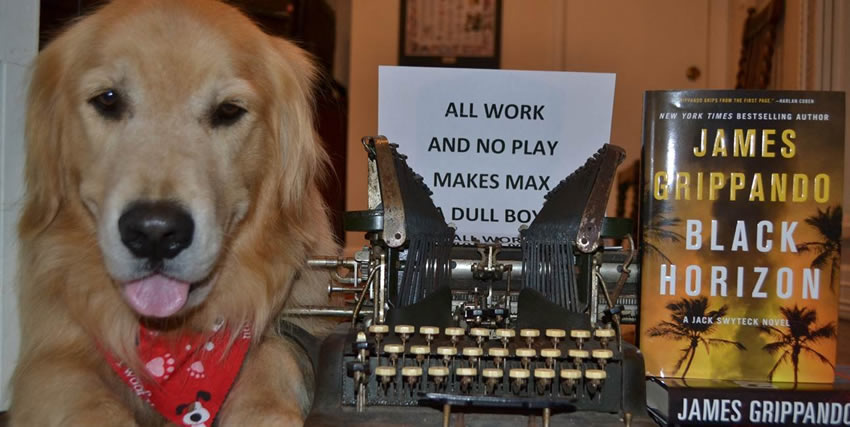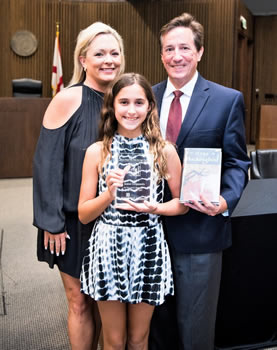

Features Up Close: James Grippando
Information Warfare Is Just One Click Away
 By K.L. Romo
By K.L. Romo
Worried about Alexa listening to your private conversations? What about identity theft? Or the census tracking illegal immigrants? If Big Brother and Big Tech had a love child, it would be Big Data—information gathered about citizens that could be used for nefarious purposes.
In CODE 6, the 30th novel and newest thriller from bestselling author James Grippando, these concerns are just the tip of the cybersecurity iceberg as billion-dollar companies, the US government, and China tabulate who will be targeted and who won’t.
In the novel, law school student Kate Gamble is writing a play, one she’s researched for years. America used the IBM Hollerith D-eleven card sorting machine to collect data for the US census. But Kate didn’t capture the more dangerous truth surrounding the machines.
In 1939, the Nazis used the same Hollerith machines to collect information about the ancestry, religious preferences, and assets of 80 million German citizens. Unfortunately, it was used to identify those with Jewish ancestry, leading to their incarceration in concentration camps. Famous playwright Irving Bass wants to direct her play, but only if Kate rewrites it to focus on the German Reich’s use of the machine to round up Jews for the death camps.
Kate has lived with techno information collection her entire life. Her father is Christian Gamble, founder and CEO of Buck Technologies, a multibillion-dollar information gathering company partially funded by the CIA. When Kate works for Buck, employee and friend Patrick Battle slips when he tells her the play is eerily similar to Buck’s classified Project Naivete.
Kate’s former boyfriend, Noah Dunn, is a senior prosecutor in the US Attorney’s Cybercrimes Unit investigating Buck in a cybersecurity audit. After Patrick’s revelation, he’s sent to the Colombian jungle for a corporate survival exercise. As Kate learns more about the clandestine purposes of her father’s company, it appears her play captures more insights into cyber-spying than she ever dreamed. Digging deeper, she discovers Buck’s data mining targets more than she ever considered: exploitation of the dreams and desires of teen girls.
Amidst Patrick’s disappearance, the cybersecurity audit, rewriting her play, and her mother’s mysterious death, Kate isn’t sure who she can trust.
Here, Grippando chats with The Big Thrill about cyber-spying, writing a play within a novel, and the history of personal data collection.
What was your inspiration for CODE 6?
My first stage play, Watson, made its world premiere in late 2019. Based on the life of IBM founder Thomas J. Watson Sr., Watson tells the true story of the Nazis’ use of IBM technology to process census data and other personal information in the 1930s, which led to the world’s first personal information catastrophe: the systematic identification of Jews for extermination.
As I wrote Watson, it reminded me of the adage “History repeats itself.” Most of us don’t worry about Big Data and “data mining”—harvesting our personal information from cyberspace—as much as we should. I didn’t want to adapt the play Watson into a historical novel, but I loved the idea of writing a thriller set in the modern world of data mining and that also drew on the warnings of the past.
The story gelled when I created the lead character, Kate Gamble. Kate is a young playwright, which provided the hook for incorporation of Watson into the storyline. Kate has a unique insight into the world of Big Data, since her father is the CEO of one of the largest data mining tech companies in the world. Through Kate’s eyes, the novel addresses the central question: At what price do we open our lives to Big Data?
Is CODE 6 a cautionary tale?
The tech world’s joke about the data-mining business model—“If the product is free, you are the product”—is more true than funny. Yet, most people accept one data breach after another, continuing to shovel personal information into the insatiable maw of social media. In a word, they “LIKE” it. Both in developing the play Watson and writing CODE 6, it occurred to me that people might not “LIKE” it so much if they knew something about the world’s first personal information catastrophe in the 1930s. In that sense, CODE 6 is a cautionary tale but also much more than that.
Kate’s determination to find the truth about her mother’s death makes for a compelling mystery. The relationship between Kate and her father makes it a powerful father-daughter story. And the relationship between Kate and her childhood friend, Patrick Battle, is especially personal to me.
My friendship with the Battle family goes back over two decades, predating the birth of Patrick Trowbridge Battle, Jr. in 2002. To his mother and all those who knew him in diapers, he was “Baby Patrick.” Patrick received a cancer diagnosis in 2017, and despite the love, prayers, and optimism of the “Battle Strong” movement, he died on December 11, 2018, at 16.
In a moment of love, compassion, and perhaps temporary insanity, I promised his parents I would write Patrick into one of my novels. We’ve all been there, wanting to do something when there’s nothing we can do. In a way, I’d promised to bring Patrick back to life.
As a published author, I’ve never experienced writer’s block, but I couldn’t find a place for a teenage boy in my next two novels. My promise to Patrick’s parents was looming, but I came up empty—no Patrick. Then, when the seeds for CODE 6 were just taking root, it occurred to me that by the time the book would be in bookstores, Patrick would have been a young man in his twenties. It was a lightbulb moment: I would age Patrick in real time.
As any novelist will tell you, writing fiction is a strange exercise, and that “other world” we create is very real to us. Patrick doesn’t just “appear” in my novel—he’s one of the main characters. Readers get to meet him, and for a moment, they might even feel “Battle Strong.”
Why did you decide to write a play within a novel?
I loved Ian McEwan’s novel Atonement. He wasn’t the first writer to wrap a novel around a play, but to my knowledge, every novel featuring a play has one major shortcoming: You can’t see the full play performed, because the full play doesn’t exist. The reader gets snippets of the play in the novel, but only those snippets that serve the novel.
CODE 6 is a thriller set in the modern world of Big Data, but it is also the story of Kate Gamble, an aspiring playwright, developing her first play. That play is Watson, and the novel includes scenes from the actual play. The script for Watson is being published simultaneously with the release of CODE 6, so readers can also enjoy the full play in a unique companion reading experience.
What research did you do for the historical details included in the book?
It took two years to write CODE 6. I spent much of that time coming up to speed on the latest developments in the tech industry and data mining. But the historical research was equally fascinating.
In June 1937, IBM founder Thomas J. Watson Sr. became the first American to receive the Merit Cross, the highest honor Adolf Hitler had (until that point) ever given to a non-German. The following year, Kristallnacht turned Nazi violence against Jews into worldwide news. By the end of 1939, Poland had fallen, and France and England were at war with Germany. By April 1940, Polish Jews were being herded into ghettos for eventual transport to concentration camps, and by May 1940, British troops were running for their lives on the beaches of Dunkirk.
In June 1940—almost three years after the award and only at the urging of friends and the demand of prominent Jewish Americans—Watson returned the Merit Cross to Hitler. But why? Business reasons? Social pressures? Or was it truly an act of courage and conscience?
Historians continue to debate those questions with no simple answer. However, the enduring relevance of the use of personal information by powerful corporations and governments is clear.
How has being a lawyer informed your writing?
As a lawyer, I’ve never worked on a single case that inspired a plot. It’s rare that the actual practice of law yields bestseller material, no matter how captivating we might think our war stories are. But lawyers see plenty of “characters”—real people with real problems who show us the best and worst of themselves.
Some say lawyers are natural storytellers, but if I had to point to one thing that gives us an edge, it would be this: understanding motive. Convincing fictional characters have strong and believable motives, and successful lawyers understand what people want, why they want it, and what they’re willing to risk to get it.
What advice do you have for other writers?
Make time to nurture and develop young talent. When my first novel, The Pardon, sold to HarperCollins Publishers in 1993, I received a letter from my editor. It was 35 pages long, singled spaced, and it contained three parts. In Part I, my editor laid out what he considered the six essential elements of suspense. Part II explained how my manuscript was deficient in all six respects. In Part III, he laid out a plan to fix it.
It’s rare for an editor at a major publishing house to take on that kind of teaching role with a debut novelist, and it is becoming rarer every day. It’s more important than ever that writers be a true writers’ community, where younger writers can learn from what more experienced writers do right, and also from our mistakes.
Tell us something about yourself your fans might not already know.
My wife and I love Broadway plays. My first look behind the curtain came not through my career as a writer, but as a lawyer. Seth Greenleaf, one of my longstanding clients, is a Broadway producer and winner of over 40 Tony Awards. Through Seth, I’ve supported several Broadway plays. One that Tiffany and I were most excited about was Matilda, which was nominated for best musical. Seth, Tiffany, and I were at the Tony Awards in 2013 when Matilda lost to Kinky Boots. Some of the Matilda family were so disappointed that they left the awards show.
It was then that Seth looked at me and said, “GFour is still up for ‘best revival’ with Who’s Afraid of Virginia Woolf. If we win, somebody has to go up on stage with me.” By “somebody,” he meant me. As a happy ending to the night, Virginia Woolf won the Tony, and there I was, onstage, as the play’s amazing director, Pam MacKinnon, accepted the award.
- The Big Thrill Recommends: WHAT YOU LEAVE BEHIND by Wanda M. Morris - June 27, 2024
- Sally Hepworth - May 10, 2024
- Katherine Ramsland - April 25, 2024




